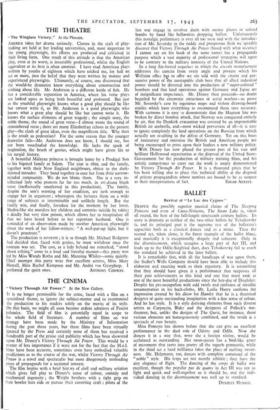" Victory Through Air Power." At the New Gallery.
THE CINEMA
IT is no longer permissible for the critic, faced with a film on a specialised theme, to ignore the subject-matter and to recommend the production to his readers solely on the merits of its style. On this basis, we might all soon become ardent admirers of Fascist polemics. The field of film is potentially equal in scope to the whole field of literature. A number of films on war strategy have been made by the Ministry of Information during the past three years, but these films have been virtually ignored by the Press and certainly none of them has received a hundredth part of the praise and publicity which has been showered upon Mr. Disney's Victory Through Air Power. This would be a matter of less importance if it were not for the fact that the M.o.I. films have been accurate, sometimes even have embodied valuable predictions as to the course of the war, whilst Victory Through Air Power is a novel and spectacular but most dangerously misleading piece of propaganda for a sectional interest.
The film begins with a brief history of civil and military aviation which gives full play to Disney's sense of colour, comedy and mechanical ingenuity ; the Wright brothers with a tight grip on their bowler hats ride or pursue their cavorting craft ; pilots of the last war engage in revolver duels with enemy planes or unload bombs by hand like balloonists dropping ballast. Unfortunately this nostalgic preliminary is over all too soon and with the introduc- tion of Mr. Seversky in the ruddy and prosperous flesh we speedily discover that Victory Through Air Power (based with what accuracy I cannot say on his book of the same name) has a propaganda purpose which a vast majority of professional strategists will agree to be contrary to the military interests of the United Nations. In a long flat-footed sequence in which the aircraft manufacturer addresses the camera from every angle and posture which his Wellsian office has to offer we are told with the charm and per- suasive power of the inescapable club bore that all allied industrial power should be diverted into the production of " super-colossal " bombers and that land operations against Germany and Japan are of insignificant importance. Mr. Disney then proceeds—no doubt beguiled by the cinematic attractions of aerial warfare—to prove Mr. Seversky's case by ingenious maps and violent drawing-board similes which have everything to recommend them save accuracy. With cartoons it is easy to demonstrate that the Maginot line was broken by direct bomber attack, that Norway was conquered entirely by air, that the Dunkirk evacuation was covered by an impenetrable British air umbrella, and—most wicked perversion of all—it is easy to ignore completely the land operations on the Russian front which actually are resulting in the defeat of Germany. Yet on this basis of inaccuracy and omission the British and American people are being encouraged to press upon their leaders a new military policy.
Walt Disney has now placed the greater part of his vast and brilliant Hollywood organisation at the disposal of the United States Government for the production of military training films, and his artistic competence to carry out the work is amply demonstrated by Victory Through Air Power. It is a thousand pities that he has been willing also to place this technical ability at the disposal of private propagandists whose motives are bound to be as suspect


























 Previous page
Previous page